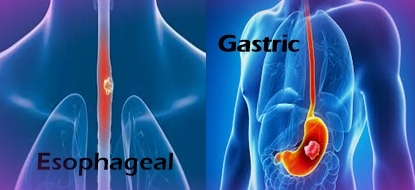Difference between Esophageal Cancer and Gastric Cancer

Cancer is defined as the uncontrolled growth of the abnormal cells in the body that can occur anywhere. Cancer is called ‘carcinoma’ in medical terms. It is a fatal disease that proves to be havoc to human life that can lead to death if it has progressed beyond the stage of intervention. The incidence of cancer has increased to a large extent these days. It is equally common in developed and undeveloped extremes of the world. Major causes of cancer are chemical compounds exposure, ionizing or UV radiations, occupational exposure to benzene, certain bacteria and virus (H.pylori, HBV, HCV, EBV), and lifestyle factors. Previously cancer remained undiagnosed till its last stage and was incurable but with the advancement in the field of medicine, it has become possible to diagnose cancer in its early stage and treat it fully. There is nobody organ which is not affected by cancer. As with other body systems, GIT is also affected by cancer. GIT cancers are one of the most common causes of cancer mortality. The six most common sites are colon and rectum, stomach, esophagus, liver, gallbladder, and pancreas.
The following article discusses the difference between esophageal and gastric cancer.
Cancer of Esophagus
Esophageal cancer is divided into two types based on histology i.e. squamous cell carcinoma and Adenocarcinoma. Squamous cell cancer arises from the flattened squamous epithelium commonly in the middle third of the esophagus. It’s usually seen in males, old age (60-70 years), and twice more common in the black race. Other risk factors are smoking, alcohol intake. SCC is also linked with idiopathic achalasia, a motility disorder of the esophagus. While adenocarcinoma arises in the lower third of the esophagus, from the glandular cells. Its risk factors are obesity, old age (50-60 years), long-standing acidity of the stomach that leads to Barrett’s esophagus, and in the white race, unlike SCC. Esophageal cancers are initially asymptomatic. The symptoms develop gradually that include difficulty in eating called dysphagia, discomfort in the throat, heartburn, weight loss, fluid accumulation in the chest, and sometimes hoarseness of voice and bleeding. Various advanced investigations are carried out to diagnose the case and management depends upon the age and fitness of the patient and stage of the disease.
Cancer of Stomach
It is one of the common tumors of the GIT. Infection with the bacteria, Helicobacter pylori (H.pylori), cause. Further risk factors are increasing age, environmental and dietary factors like increased intake of smoked, spicy food containing nitrates. Men are more affected than women. People with first degree relatives who have had stomach cancer are at high risk. According to Lauren Classification, it also has two varieties of cancer i.e. intestinal type and diffuse adenocarcinoma of which adenocarcinoma is the most common (95%). Gastric carcinoma spreads via direct invasion to the pancreas, colon and the liver, hematogenously to liver, lung, and bone and lymphatics. It also spreads through stomach walls into the surrounding structures like peritoneum (Transperitoneal spread) Clinical picture includes pain in the stomach, loss of appetite, weight loss, nausea, blood in vomiting, or stool. Investigations are similar to those of esophageal cancer and management is mainly surgical removal of the affected part or whole of the stomach.
Esophageal Vs Stomach Cancer
Location:
Esophageal cancer is more common in the lower third of the esophagus.
Stomach cancer is more common in upper and lower ends of the stomach called pylorus and antrum respectively.
Symptoms:
Esophageal cancer causes weight loss, difficulty, and pain on eating and drinking.
Gastric cancer shows loss of weight, pain in the stomach, and loss of appetite.
Geographical areas:
Esophageal cancer is more common in China, Iran, and the USA.
Gastric cancer is common in South Korea, Mongolia, and Japan.
Risk factors:
Esophageal cancer is caused by alcohol, smoking, and GERD.
Stomach cancer is caused by alcohol, H.pylori, spicy food, smoked food, and nitrates.
Types:
Esophageal cancer is of two types i.e. squamous cell cancer and adenocarcinoma.
Gastric cancer has got varieties called intestinal type and diffuse cancer.
Investigations:
Esophageal cancer is diagnosed through endoscopic ultrasound, barium studies (esophagram), upper endoscopy, also called esophagus-gastric-duodenoscopy, or EGD and biopsy.
Stomach cancer is diagnosed through endoscopy (gold standard), ultrasound, PET scan, CT scan, staging laparoscopy, and biopsy.
Treatment:
Treatment depends upon the extent and stage of the disease.
Esophageal cancer is treated mainly through surgical resection called esophagectomy, chemotherapy, and radiotherapy or a combination of both.
Gastric cancer is treated by endoscopic mucosal resection (EMR), gastrectomy, radiotherapy, and chemotherapy.
Conclusion
Cancer of GIT is a life-threatening disease that requires the earliest diagnosis and treatment otherwise it leads to death. Their incidence has increased over the past few years due to an unhealthy diet and sedentary type of living standards. There are some general lifestyle changes we should try to adapt to reduce the risk.


Leave a Reply